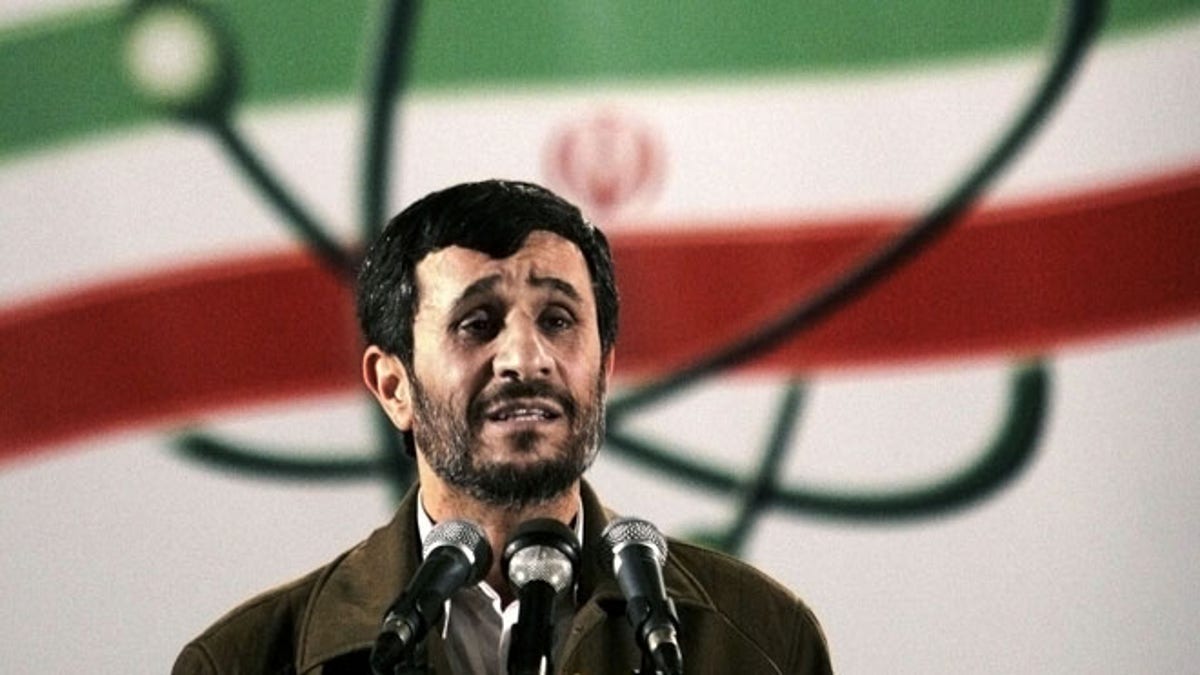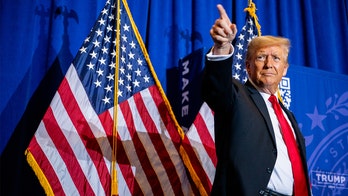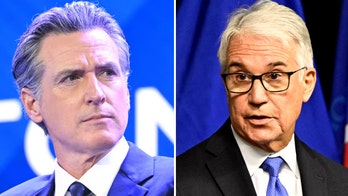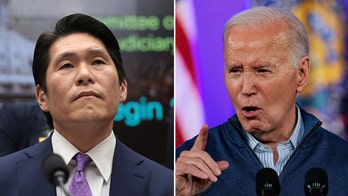
April, 9, 2007: Iranian President Mahmoud Ahmadinejad speaks at a ceremony in Iran's nuclear enrichment facility in Natanz, Iran. (AP)
President Obama's preferred path to end the Iranian nuclear standoff faces a stern test this week when world powers sit down with Iran in another bid to press it to meet international demands to prove it is not trying to develop nuclear weapons. Failure will strengthen calls for military action.
Wednesday's talks in Baghdad come at a critical juncture in the almost decade-long effort to persuade Iran's government to halt its enrichment of uranium and allow unfettered access to international inspectors, with Israel continuing to speak of a possible attack. Republican rival Mitt Romney also has derided Obama's engagement efforts, putting pressure on the president to deliver progress soon.
The chief of the U.N. nuclear watchdog, Yukiya Amano, said Tuesday that the agency had reached a deal with Iran that would allow it to resume a long-stalled search for evidence that Iran worked secretly to build nuclear arms.
After talks Monday in Tehran between Amano and chief Iranian nuclear negotiator Saeed Jalili, "the decision was made ... to reach agreement" on the mechanics of giving the International Atomic Energy Agency access to sites, scientists and documents it seeks to restart its probe, Amano told reporters in Vienna Tuesday.
However, Israeli Prime Minister Benjamin Netanyahu, whose country sees Iran as a threat to its very existence, reminded world powers they need to be tough.
"Iran wants to destroy Israel, and it is developing nuclear weapons to fulfill that goal," he said. Iran insists its nuclear program is for peaceful purposes only.
The Obama administration is being vague about its immediate goals. Despite warning of an increasingly narrow time frame for a negotiated agreement, officials say the discussions in Iraq's capital will gauge Tehran's seriousness and explore elements of a possible agreement. The strategy aims to avoid the all-or-nothing stakes that have derailed previous talks. Even within the administration, attitudes range from skeptical to extremely cautious.
In a statement Tuesday, Robert A. Wood, the chief U.S. delegate to the IAEA, said Washington appreciated Amano's efforts but remained "concerned by the urgent obligation for Iran to take concrete steps to cooperate fully with the verification efforts of the IAEA, based on IAEA verification practices."
"We urge Iran to take this opportunity to resolve all outstanding concerns about the nature of its nuclear program," Wood said. "Full and transparent cooperation with the IAEA is the first logical step."
Last week, White House press secretary Jay Carney said, "The pressure will be on the Iranians to demonstrate continued good faith." He called on Tehran to address its nuclear program "in concrete ways" with the U.S., Russia, China, Britain, France and Germany, and said sanctions and pressure on Iran would continue as well, led by the United States.
Congress is about to negotiate bipartisan legislation to green-light stronger sanctions. The Senate on Monday approved tough new penalties on the Tehran regime, while the House passed its version of the measure in December.
Asked about the objective for Baghdad, State Department spokeswoman Victoria Nuland said, "We want to see a really concrete, serious discussion about steps that will demonstrate that we are moving in the right direction."
Obama opposes a near-term military strike on Iran's nuclear facilities and has pressed Israel to give diplomacy and sanctions time to work. He insists that military options are available should talks fail, a position that clashes with Netanyahu and increasingly hawkish Republicans who want him to act even tougher.
Netanyahu in particular has charged the process with being too accommodating to Tehran. "I see no evidence whatsoever that Iran is serious about ending its nuclear program," he said last week.
For all the talk of a positive atmosphere, U.S. officials have struggled to demonstrate any progress so far. They cautiously welcomed last month's opening meeting in Istanbul but pushed off the harder questions until after this week's follow-up talks. Official comments have continued to stress the importance of the process over single rounds of discussions, suggesting there may no breakthrough following the Baghdad meeting.
But patience isn't inexhaustible. Many in the United States have accepted the Jewish state's argument that Iran's enrichment activity may be too far along and buried too deep underground after this summer for Israel to take military action. And a solid majority of Americans support the option of military action against Iran to prevent it from developing nuclear weapons, according to a recent Pew Research Center survey.
Lengthy negotiations without a clear outcome would enrage Israel because Iran would presumably continue expanding its nuclear program in the meantime. For Obama, however, the talks are a calculated political risk.
On the one hand, they buy his administration some time on a tough decision over possible military action at a time of fevered partisan debate linked to November's presidential election. But if the process collapses before then, it would undermine Obama's claims of sturdy leadership on national security issues, from winding down America's wars in Iraq and Afghanistan to killing Al Qaeda leader Usama bin Laden.
The U.S.-Israeli disconnect has spilled over repeatedly into America's presidential race, with GOP candidates jockeying throughout the primary season to position themselves as the best defenders of Israel's security. Since emerging as the party's clear nominee, Romney has continued to accuse Obama of sacrificing Israel's interests, arguing several times that his re-election would guarantee Iran's production of a bomb.
But a military response is not without pitfalls, which could explain why Romney has shied away from explicitly threatening American strikes anytime soon.
An attack may set back Iran's pursuit of nuclear weapons capability but would be unlikely to deliver a death blow to the program. And Iran can retaliate in several ways against U.S. interests, from disrupting Mideast oil deliveries to supporting proxy terrorists against allies such as Israel or unstable states like Lebanon.
Avoiding these constraints, Republicans have focused their criticism of Obama for holding talks with Iran at all.
"The administration's foolish embrace of yet another round of negotiations will only embolden the regime," said Rep. Ileana Ros-Lehtinen, R-Fla., the chairwoman of the House Foreign Affairs Committee. "The administration has made concession after concession in its negotiations with Iran only to come (home) empty-handed. The Iranian approach seems to be, `What's mine is mine, and what's yours is negotiable."'
Ros-Lehtinen referred to diplomatic rumblings suggesting the Obama administration could allow Iran to enrich low-grade uranium if it halted activity at levels closer to weapons-grade material.
The United States has long demanded an end to all Iranian enrichment, in line with U.N. Security Council resolutions, along with unfettered access for inspectors and the transfer of already enriched stockpiles out of the country.
Secretary of State Hillary Rodham Clinton and other officials have denied that the U.S. is changing its position on enrichment.
Thus, if Iran maintains a hard line on enriching uranium, even at lower levels for nuclear fuel production, it would put the Obama administration in a difficult spot between joining its international partners who would prefer to meet the Iranians halfway and appearing weak in an election season.




